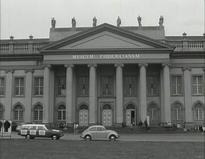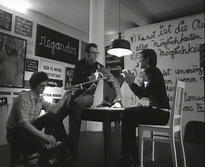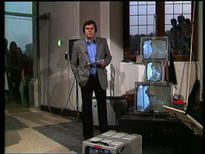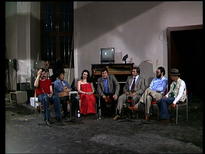DOCUMENTA 4-6. ART, MEDIA AND THE ANTINOMIES OF MEGA-ART EVENTS
SCREENING - BLACK BOX
At a time when Kassel is in the midst of preparations for d13, Argos takes a look back through the prism of television reporting to a key period in the history of this mega event. The documenta time-line runs parallel with that of television. The ARD company made the first television broadcast in Germany on 1st November 1954. It was on 15th July of the following year, during the Cold War, that the first documenta was held. The period from 1955 to the present reads like a story of upscaling for the masses, rooted in the consumer and entertainment culture, media proliferation and advancing populism. The only partially achieved social and artistic aims of the curators and artists, inherent to working in a format that has to reconcile all manner of paradoxes and contradictions, were another constant in this period.
If one were to draw up an account of the reception of contemporary art, one could not ignore the documenta-era from 1968 to 1977. Two documentaries by Jef Cornelis (d4 & d5) and a live broadcast by the Hessischer Rundfunk (d6) tell the story of the strangled ambitions, misunderstandings and the overriding madness of the moment.
The first three documentas, organised by its initiator Arnold Bode, showed a retrospective overview of international art that was intended to put postwar Germany back on the map. Cornelis’ film documenta 4 marked the break with what had gone before. Now it was all ‘art as it happens’. A twenty-four member jury that included Bode came up with a chaotic exhibition. In 1968, the year of revolution, art was in the midst of a breakdown of authority. Cornelis’ documenta 5 unmasked the work of the curator Harald Szeemann as a consumer spectacular rather than the laboratory for art and society that had originally been envisaged. In 1977 Peter de Leuw and Hansgeorg Dickmann’s documenta 6 sailed under the flag of ‘art in the media society’. During a live broadcast by the Hessischer Rundfunk such artists as Nam June Paik and Joseph Beuys found themselves in hostile territory. As far as the granting of equal rights to art and the media was concerned, and the notion of anti-openness, the only thing they could still do was make a pastiche of them.
Opening Night 21.04.2012 // 18:00 - 21:00
Screening programme:
11h00
Jef Cornelis - Documenta 4
1968, 53’40", b&w, Dutch, English, French and German spoken, English subtitles.
12h00
Jef Cornelis - Documenta 5
1972, 53’19", colour and b&w, Dutch, English, French and German spoken, English subtitles.
13h00
Peter de Leuw & Hansgeorg Dickmann - documenta 6
1977, 40’26", German spoken, English subtitles.
Peter de Leuw & Hansgeorg Dickmann - documenta 6 - Ad hoc Diskussion nach der Eröffnung der documenta 6
1977, 44’50", German spoken, English subtitles.
14h30
Jef Cornelis - Documenta 4
1968, 53’40", b&w, Dutch, English, French and German spoken, English subtitles.
15h30
Jef Cornelis - Documenta 5
1972, 53’19", colour and b&w, Dutch, English, French and German spoken, English subtitles.
16h30
Peter de Leuw & Hansgeorg Dickmann - documenta 6
1977, 40’26", German spoken, English subtitles.
Peter de Leuw & Hansgeorg Dickmann - documenta 6 - Ad hoc Diskussion nach der Eröffnung der documenta 6
1977, 44’50", German spoken, English subtitles.
Gerelateerde evenementen




-
zo 22.4.2012
- zo 01.7.2012
-
Praktische info
Location:
Argos
Werfstraat 13 rue du Chantier
1000 Brussels
info@argosarts.org
+32 2 229 00 03
Opening hours:
Wednesday to Sunday, 11:00 to 18:00
Entrance Fee:
5 / 3 euros - Kunstenaars
- Werken